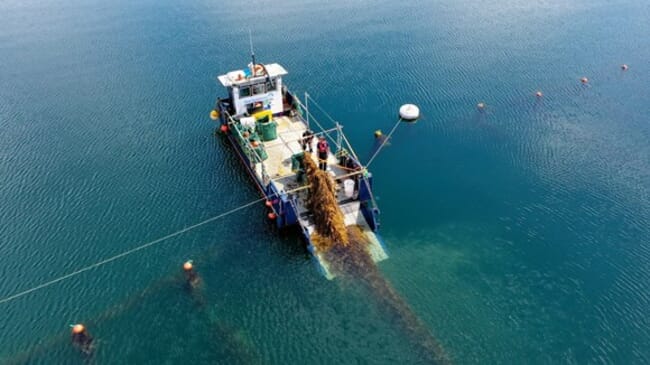
Based at SAMS, near Oban, the academy aims to catalyse growth of an industry that has a crucial role to play in the UK’s net zero, regional growth and levelling up aspirations. It will provide an innovative service to the sector, from seeded line through to research and practical skills at SAMS’ existing seaweed farm sites.
The £407,000 grant from the UK Government’s Community Renewal Fund is one of 56 projects across Scotland to share an £18 million investment to help people into work and deliver net zero.
Globally, the seaweed farming industry has been growing exponentially and is estimated to be worth around $15 billion per annum. However, the vast majority of this activity is in Asia and there is huge growth potential in Europe, with a growing demand for seaweed from gourmet restaurants to livestock feeds.
Already used extensively in food ingredients, agriculture, cosmetics and pharmaceuticals, seaweed farming has a low carbon footprint, using no fresh water and with minimal land-based infrastructure.
SAMS director, Prof Nick Owens, said: “Using our own seaweed farms and the most up to date research, we have been laying foundations for a thriving UK seaweed farming industry. We are excited to now move into the next phase of training, education and business development, which will see our ambitions realised.
“SAMS works internationally on seaweed research and we are well placed to deliver the most up-to-date advice for start-ups and existing farmers who wish to develop their business.
“We are grateful to the UK Government for its investment in this climate-friendly industry that will not only support the regional economy of the Highlands and Islands, but will show others an example of the best of the blue economy.”
The Seaweed Academy will be operated by SAMS, in partnership with SAMS Enterprise and Argyll College, a fellow academic partner within the University of the Highlands and Islands, and will deliver immediate economic benefit to Argyll and Bute. It also aims to stimulate the growth of UK seaweed aquaculture, exploring high-value markets, and using the latest research to increase the competitiveness of UK products globally.
SAMS will also promote seaweed production as a means of bioremediation, including the resulting carbon sequestration, therefore mitigating the impacts of climate change.
SAMS Professor Michele Stanley specialises in seaweed research and is speaking today at a COP26 side event on seaweed. She said: “Seaweed is already widely used in food, cosmetic, pharmaceutical and agriculture industries and has potential as a biofuel.
“But the benefits of seaweed farming go beyond natural products; it increases and restores biodiversity by providing habitats for marine creatures and can help to mitigate climate change through carbon capture and methane emission reduction.
“There is also a growing commercial demand for higher value seaweed-derived products, such as hydrocolloids and for food ingredients and medical treatment and high-bacto agar used as a laboratory medium for Covid-19 testing.”
To help fully embed the new industry at a community level, SAMS’ Ocean Explorer Centre (OEC) will develop STEM educational outreach materials to raise awareness of seaweed farming, climate change and the importance of net zero, from primary storytelling to workshops for Higher/A-level curricula, ensuring a holistic approach from primary to PhD level and beyond.




